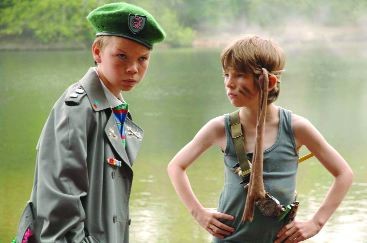Son of Rambow

I took my 11-year-old son to see Son of Rambow as a form of retreat from the current armada of blockbusters. I had heard that the film, an audience favorite at the 2007 Sundance Film Festival, was full of uplifting messages about friendship, imagination, creativity and tolerance. My son said he liked it, as he sprang from his seat the moment the credits began to roll (an act of movie sacrilege that I’m trying to address). I had reservations about the film, but not wanting to dampen his enthusiasm, I said I liked it too.
During the drive home, however, as he picked at the last kernels of popcorn, he also started picking at some of the inconsistencies in the film. Why did this happen? Why did he say that? Wouldn’t he have done this instead of that if that had occurred? I tried to answer his queries as best I could, straddling the line between father and film critic, until I finally began to acknowledge that there were “holes in the script.” He listened and nodded, before defending his original conclusion: “I liked it anyway.”
Son of Rambow, a low-budget British film set in a small English village in the early 1980s, concerns the friendship between two 11-year-olds. Will Proudfoot (Bill Milner) is a shy lad who belongs to a conservative Christian sect that doesn’t allow any exposure to movies, television or music. Lee Carter (Will Poulter) is a rough-and-tumble troublemaker who lives with his neglectful older brother, Lawrence (Ed Westwick). Lee hopes to win a short-movie competition sponsored by the BBC, and to that end is using his brother’s camera to make his own video about Rambo, the action hero of the time.
Will begrudgingly agrees to be a stuntman in Lee’s epic. His enthusiasm increases after he sees a bootleg copy of the first Rambo movie—his first movie experience ever—with its sweaty bodies, rampant killing and nonstop explosions. Inspired, Will shares with Lee his own potent imaginary world, which he explores by doodling in his Bible. Lee has to admit that Will’s world of evil scarecrows and flying dogs would make a great addition to the film. So before they can say “It’s never over!” Will has become the film’s skinny Rambow.
By far the best parts of the movie are the scenes of the boys shooting their film. But it couldn’t be a movie without the subplots that complicate the tale and develop challenges that must be overcome. And that is where the film falls short.
First there’s a problem with the references to Will’s religion. It seems the only reason writer-director Garth Jennings (The Hitchhiker’s Guide to the Galaxy) is interested in Will’s religious background at all is to explain Will’s awe and wonder upon first seeing the hyperviolent Rambo. All the members of the Brethren, as they’re called, are portrayed as grim killjoys who love nothing more than spoiling the fun of childhood. (There’s even an over-the-top flashback of the mother’s childhood experience of having her record player being burned in a bonfire by the cruel elders.)
Another problem is the portrayal of Lee’s home life. Lee and his brother live in the fancy living quarters of a nursing home, which would seem to open up all sorts of possibilities for contrasting the dreams of childhood and the memories of old age. In one scene the boys dress up one of the residents in a headband and wig to portray Rambow’s father in their movie. But the man could just as easily be an old coot living next door. Why introduce the nursing home setting unless you are going to explore it?
Finally, there is a problem with the potentially humorous B story about a French foreign-exchange student named Didier (Jules Sitruk) who takes over the school. Didier exudes Gallic ennui and eventually assumes the lead in the boys’ movie, causing a temporary rift between Will and Lee. But then the humor is drained out of this oddball character.
What we are left with is a sweet idea weighed down by underdeveloped subplots, unnecessary plot twists and underwritten secondary characters. The script could have stood a few more rewrites. I’d like to borrow my son’s forgiving attitude and say, “I liked it anyway.” But grown-ups can be a grumpy sort.





